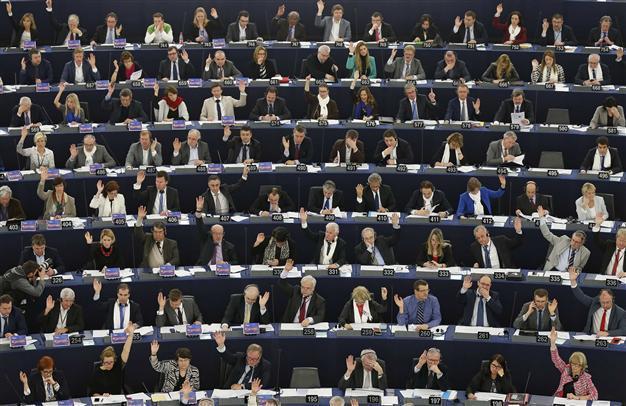European Parliament set to vote on ‘genocide’ claims
BRUSSELS

REUTERS Photo
The European Parliament is set to discuss and vote on a resolution April 15 on the claims of genocide about the mass killings of Armenians at the hands of Ottomans a century ago, turning up the heat on the debates before a ceremony in Armenia on April 24.The European Parliament will decide whether to name the year 2015 as the centennial of the Armenian genocide perpetrated in the Ottoman Empire.
The draft joint motion stated an increasing number of EU member states and national parliaments recognize the Armenian genocide, outlining the main motivations of its unification movement is to prevent the recurrence of wars and crimes against humanity in Europe.
If passed, the Parliament would “pay tribute, on the eve of the Centenary, to the memory of the one-and-a-half million innocent Armenian victims who perished in the Ottoman Empire,” linking the centenary commemoration of the genocide to the spirit of European brotherhood, solidarity and justice.
The parliamentarians will also decide whether to pay tribute to “the memory of innocent victims of all genocides and crimes committed against humanity through the establishment of a European International Remembrance Day for all genocides.”
They will also discuss whether to accept the statements of President Recep Tayyip Erdoğan and Prime Minister Ahmet Davutoğlu offering condolences and recognizing the atrocities as a step in a right direction. The statement said the importance of the ceremony in Armenia as an “important opportunity for Turkey to continue its efforts, including the opening of the archives, to come to terms with its past, to recognize the Armenian genocide and thus pave the way for a genuine reconciliation between Turkish and Armenian peoples.”
The Parliament is likely to invite Turkey to “respect and fully realize the legal obligations it has undertaken for the protection of cultural heritage,” by conducting “an integrated inventory of Armenian and other cultural heritage sites destroyed or ruined during the past century.”
Secretary-General Ban Ki-moon, meanwhile, considers the killings “atrocity crimes,” but he does not support Pope Francis’ description of the killings as “the first genocide of the 20th century.”
In response to the Pope’s comments on April 12, Ankara withdrew its Vatican ambassador, while accusing Francis of spreading hatred.
Armenia calls the violence of 1915 a “genocide,” defending that 1.5 million people were killed, while Turkey says the death toll has been inflated and that those killed were victims of civil war and unrest.
“The U.N. has sought to strengthen the capacity of the international community to prevent such atrocity crimes from ever occurring,” U.N. spokesman Stephane Dujarric said.
Dujarric told reporters that Ban took note of the Pope’s comments and is fully aware of “the sensitivities related to the characterization of what happened” in 1915 and the April 24 commemoration of “the tragic events” by Armenia and others around the world.
He said the secretary-general firmly believes that the commemoration, along with continuing cooperation between Armenians and Turks to establish the facts surrounding the events, “should strengthen our collective determination to prevent similar atrocity crimes from ever happening in the future.”
Dujarric said Ban did not envision an international commission was necessary to examine the facts. “There’ve been discussions with the countries concerned, and communities concerned and I think it’s important that those discussions continue.”
The Pope made his pronouncement during a mass in St. Peter’s Basilica commemorating the centenary, with Armenian church leaders and President Serge Sarkisian in attendance. Francis said it was his duty to honor the memory of the innocent men, women and children who were “senselessly” murdered by the Ottoman Turks.
Earlier on April 13, the European Union urged Turkey and Armenia to normalize ties.
EU Foreign Affairs Spokesperson Maja Kocijancic said the EU encouraged the countries “to consider additional, meaningful steps that would pave the way toward full reconciliation.”
















